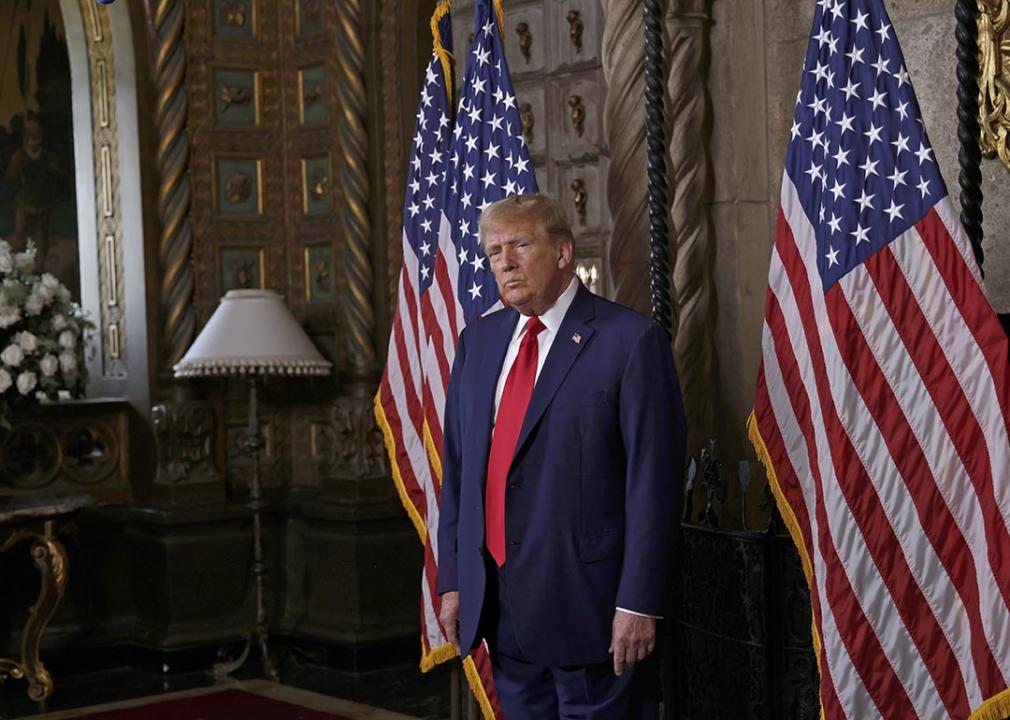Donald Trump falsely claims migrants are displacing NYC students in spite of empty seats in city schools

Alon Skuy // Getty Images
Donald Trump falsely claims migrants are displacing NYC students in spite of empty seats in city schools
former President Donald Trump speaks in the library at Mar-a-Lago
Former President Donald Trump falsely claimed this week that migrant students are displacing other children from New York City’s schools.
In fact, Chalkbeat found that the city’s public schools have struggled in recent years with the opposite problem: too many empty seats.
Enrollment has ticked up slightly this school year, thanks in part to an influx of migrant students, though still remains about 9% below pre-pandemic levels. Education Department officials have said boosting school rosters is a top priority, as lower enrollment can lead to smaller budgets, mergers, and closures.
In an interview with the Right Side Broadcasting Network on March 4, Trump claimed without evidence that “we have children that are no longer going to school” because of the influx of migrants.
“I’m not blaming them,” he said. “I’m saying they put the students in the place of our students like in New York City. We have these wonderful students who are going to school — all of a sudden they no longer have a seat.”
A spokesperson for the Trump campaign did not respond to a request to elaborate on his comments. There is no evidence that any students have been left without a school seat due to the arrival of new migrants, and an Education Department spokesperson said the claims were false.
“We will continue to work with students, families, and partners to ensure that newcomer students have what they need in our public schools and that our schools are well equipped to support these needs,” Education Department spokesperson Nicole Brownstein wrote in a statement.
Immigration advocates also blasted Trump’s comments.
“The idea that we somehow don’t have space or that children are being removed from schools is just completely unfounded,” said Liza Schwartzwald, director of economic justice and family empowerment at the New York Immigration Coalition.
Trump, the likely Republican nominee for president, has sought to make immigration a centerpiece of his reelection campaign and has escalated anti-immigrant rhetoric, promising to revive a ban from some Muslim-majority countries and refusing asylum claims. He has also swept discussion of education into some campaign stops, claiming at a March 2 rally in Virginia that New York schools are overwhelmed teaching students who speak languages “that nobody ever heard of.”
Since the summer of 2022, Republican governors of southern border states have sent busloads of migrants to cities with Democratic leaders, including New York. Over that period, about 36,000 children who live in temporary housing have enrolled in the city’s public schools — including 18,000 this school year — many of them migrants. City officials do not ask for a student’s immigration status when they enroll.
The city’s Education Department is required by law to provide a seat to any school-age child who needs one regardless of their immigration status. Many school communities have worked hard to welcome migrant students and provide appropriate instruction in English and their home language.
And while there is no evidence that migrants have displaced other students, some parent leaders and other groups have protested the new arrivals.
In January, Brooklyn’s James Madison High School pivoted to remote learning for one day after migrant families were temporarily housed there because severe wind threatened tent shelters at Floyd Bennett Field that housed newcomers. The episode generated vitriol from some families and morphed into a talking point for right-wing pundits. But several students and parents were perplexed by the outrage and noted the disruption was minor.
“The hostility toward the migrants was definitely uncalled for,” senior Zola Zephirin told Chalkbeat. “These are people, they have families, they come here and attempt to make a better life, just like many of the students at Madison.”
Schools have sometimes struggled to accommodate newcomers. The enrollment process has been bumpy for some migrant families as the city scrambled to keep up, and schools often can’t hire enough bilingual educators, a long-standing shortage area. At the same time, city officials have tweaked the school funding formula to funnel more dollars to schools with more students living in temporary housing — which benefits schools with more migrant children.
For his part, New York Mayor Eric Adams has sent mixed messages about the influx of migrants. Last year he claimed the influx of migrants would “destroy” the city, drawing outrage from immigrant groups, and has blamed them for cuts to city services. But he also celebrated the uptick in public school enrollment, fueled in part by new arrivals.
Some advocates, including Schwartzwald, see parallels between Trump and Adams’ rhetoric and worry about the climate it creates for asylum seekers, some of which has reverberated in schools. Some students at Newcomers High School, for instance, have sought a name change in part because they fear the label “puts a target on us.”
“When Mayor Adams uses rhetoric where he — just like Trump — tries to create an ‘us’ and a ‘them’ — what he’s saying is not all immigrants are New Yorkers,” Schwartzwald said. “Anyone who comes to New York to make a life is a New Yorker as far as we’re concerned.”
![]()





